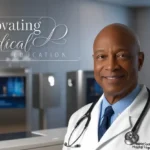Discover the Best Addiction Treatment Centres: Rehabilitation Centres in Cape Town & Verslavingskliniek Zuid Afrika
Addiction can affect anyone. If not well dealt with it can affect individual families, places of work, and even whole societies. The good news? Thereьют patients who are willing to start their life over, and rehabilitation centers are there to help. Around the world, there seems to be more availability of recovery resources and for some reason one place is emerging as a sought-after getaway destination, namely South Africa and specifically Cape Town.
This blog concerns issues like why Cape Town is increasingly being considered the best place for addiction treatment, what such a process involves, and how family and healthcare givers are aspects of the treatment story. If it is about getting help for yourself, a friend or family member or if you are involved in the respective field, this article will provide valuable information about the rehabilitation options in Cape Town.
Understanding Addiction
Substance dependency is a multifaceted issue and one that is still not fully well understood. It is more than just a vice or failure of will power; addiction is in fact a disease- an illness that impacts the brain reward, motivation and memory circuits. It does not only affect participants fighting drug and alcohol addiction; families get pulled in, not just physically, emotionally, mentally, or financially.
Why Professional Help is Crucial
Pinning hope on willpower is one of the worst things that can be considered when trying to overcome an addiction. Rehab centres are professional programmes developed with the aim of fitting the physical, emotional and psychological aspects. The centers offer a much needed outlet; by connecting to people who are medical professionals, therapists as well as support systems, these centers offer an opportunity for most of these people to get the chance to heal and start the process of rebuilding their lives.
Spotlight on South Africa
Why South Africa for Addiction Treatment?
South Africa is turning increasingly into one of the world’s most preferred destinations for addiction treatment. Some of the reasons include; • The costs are relatively cheap • The facilities are highly developed • The environment is magnificent, quiet and serene for healing. Rehabilitation centers in Cape Town are supposed to equip people with an environment where they will have no choice but to work on their recovery owing to a lack of the factors that may hinder this process given the holding environment that usually surrounds patients.
Cape Town specifically offers:
- Nature as Therapy: The vivid geographical features in particular are beneficial to mental and emotional healing since Cape Town is located between the ocean and mountains.
- World-Class Experts: A large number of centers located in South Africa employ highly-qualified professionals who provide the most effective types of treatment, such as CBT or art therapy and manifested by different branches of occupational therapy including wilderness therapy.
- Cost Effectiveness: By comparison with the European and specifically American rehabs, South African facilities provide rather a high level of services for lower costs, which makes it financially reasonable for the clients coming from other countries.
The Rehabilitation Process
Rehabilitation is not simply the process of cleaning or ridding oneself of drugs – it is a lifetime process. Here’s what the typical process entails:
1. Intake and Assessment
The recovery starts with intake or an investigation into the person’s background, the factors that precipitated the behavior, and the requirements of the situation. This step aids in developing a special management program.
2. Detoxification
In many cases, detoxification is the initial process of cleansing the body of unhelpful substances under the guidance of doctors. South African facilities make this stage as safe and comfortable as they can be.
3. Therapy and Counseling
Recovery is founded on counseling. Group and individual therapy are basically used so that clients can identify the cause of their addiction. Various therapeutic methodologies contain CBT, mindfulness techniques and family therapy and others.
4. Life Skill Training
Recovery, it is also important to note, is also about the reconstruction of one’s life. Many patients complete practical skill training before usable during aftercare – stress management, healthy boundaries, and relationship building among them.
5. Aftercare Support
Rehab is just but the tip of the iceberg; people need to understand that recovery does not happen at the end of the journey. There are different types of centers and all of them provide aftercare programs to the clients to help them stay sober. This usually encompasses alumni, groups and even follow up therapy depending on the individual.
Success Stories from Cape Town Rehabilitation Centers
Positive testimonial proofs and examples which show that the recovery centres located in South Africa offer immense satisfaction. For example, a subject, Sarah from the UK for treatment after facing alcoholism problems, opts for Cape town. Upon finishing her program, she pursued her college degree and now man an addiction counselor. It reveals how the approach of South African centers prepares an individual for not only cleansing but for the actual flourishing.
The Role of Family in Recovery
Dopamine is never a personal fight- everyone becomes a victim of the substance to which the end user is addicted. That is why the family’s participation is actively encouraged in many rehabilitation programs. Why is this important?
- Understanding the Disease: Here families are empowered not to blame the patient or judge him as there is information sharing regarding addiction.
- Building Communication: Mainly, therapy helps to restore proper communication and build up trust between family members.
- Providing Support: Another factor indicating that the chance of a full recovery is better after rehabilitation is a strong family support system.
Most of the centers in South Africa provide workshops, counseling and telephone consultation services to families – something which can be a source of comfort in what may be a wrenching experience.
Healthcare Professionals as Partners in Recovery
Most rehabilitation centres in Cape town, therefore, do not work singly but rather in synergy with other healthcare facilities. In this partnership each step ranging from referrer relationships to after care planning is fully covered and personalized. In some occasions, clinics tend to collaborate with psychologists; psychiatrists and general practitioners to enhance the results.
Hope Is Closer Than You Think
Jenkins stated that addiction is almost too difficult to overcome but with some kind of support a person can always get back on their feet. Most rehabilitation centres in Cape Town give people a chance to start afresh under encouraging circumstances. Whether one is searching for solutions for self or for others, the initial step is all that is needed to potentially experience change beyond imagining.
In case you or your dear ones decided to get professional help, act now! Looking for the best rehabilitation centers in Cape Town and to know how they can help you through that transformative process. You must note that it’s better to ask for assistance since this is a form of strength not a weakness.
Understanding the Rehabilitation Process
Rehabilitation is a systematic plan for restoring an individual to optimum functioning when physical, mental or emotional rebound is impaired or lost. Most of the time it actually starts off as a certain evaluation to determine the requirements of an individual and the treatments administered are oriented towards rehabilitation and holistic health. Not only can people get rid of the difficulties they face at the moment but can also learn how to create a better life for themselves.
Benefits of Professional Support
A variety of services offered at professional rehabilitation centers are most advantageous over other general healthcare services. This includes; availability of certified professionals, care givers, and approved care plans and secure workplace. By doing so, people learn how to handle personal challenges better, reconnect with family and friends, and promote self-esteem. The professional touch helps in making sure of the endurance in coping with all parts of recovery.
Choosing the Right Center
The selection of the rehabilitation center is an important process that negatively or positively influences the further treatment. Hence, some of the areas that should be focused include the professional staff and programs of the institution, options, and other questions such as the environment. That is why for those people who need help in South Africa, it is possible to choose one of the best Verslavingskliniek Zuid Afrika to address. It is also also possible to read success stories about the centre and to post the review concerning the choice of the place, which is very popular among people. The only thing to remember here is that the best match increases the likelihood of positive, lasting change, and a Verslavingskliniek Zuid Afrika means you can have a strong selection of counselors and therapists that can help you that much more in your recovery.
Building a Support System
Recovery, as mentioned before, is a long process and requires a lot of support from family and friends. People within a person’s close network such as family members, friends, or support groups or even personal trainers can work towards motivating the person all through the activity. A large number of rehabilitation centers insist on the family’s involvement in the process to feel responsible for the patient’s recovery. Such efforts are explained by the fact that when people have a good network, they are always able to overcome various impediments and strive to achieve their objectives diligently.
Conclusion
Recovery, as mentioned before, is a long process and requires a lot of support from family and friends. People within a person’s close network such as family members, friends, or support groups, or even personal trainers, can work towards motivating the person all through the activity. A large number of Rehabilitation Centres Cape Town insist on the family’s involvement in the process to feel responsible for the patient’s recovery. Such efforts are explained by the fact that when people have a good network, they are always able to overcome various impediments and strive to achieve their objectives diligently. Rehabilitation centres Cape Town understand the importance of a strong support system, integrating family and loved ones to ensure the best possible outcomes for those in recovery.
FAQs
1. What types of addictions are treated at rehabilitation centers in Cape Town?
Kicking the first step to the journey, to the process of recovery is never easy but by far it’s a hopeful move because once it is embarked, rehabilitation centers in Cape Town are willing to accompany the individual or the patient every step of the process. These centres are provided with professional care, positive groups, as well as effective treatments based on scientific findings, with the only purpose of assisting a person rebuild their life. There’s light at the end of the tunnel no matter how dark that tunnel looks at the moment, there is support and there is hope. It is a great idea to take that first step towards a new and improved life today, it might just be the best decision you’ll ever make.
2. How long does a typical rehabilitation program last?
There are various forms of rehabilitation centres in Cape Town and the type of addictions accessed by these centers include substance abuse centre, which comprises alcohol, drug, or medication addiction, behavior abuse centre dealing with gambling and gaming, and mental health abuse centre that tackles co-substance dependency. Every of these centers has their specialty programs that can address specific or general specific needs of each person.
3. Are rehabilitation centers in Cape Town affordable?
The length of stay in treatment may depend on the client’s requirements and condition of affliction as well as the type of treatment program. Programs overall may last between 28 days and several months. Moreover, most of the centers also provide follow up or outpatient and aftercare services to help patients maintain the required recovery.









